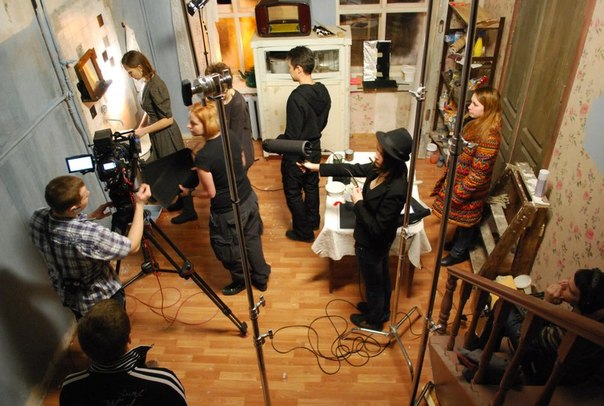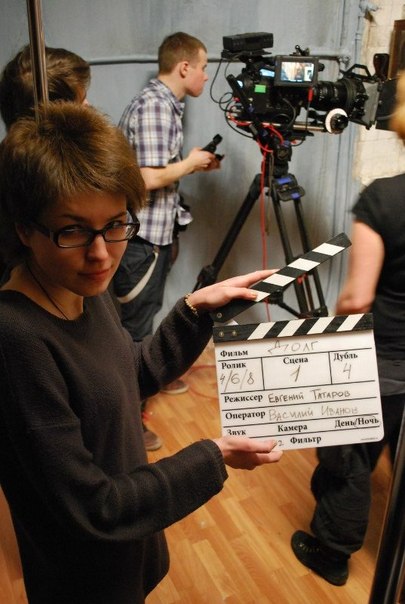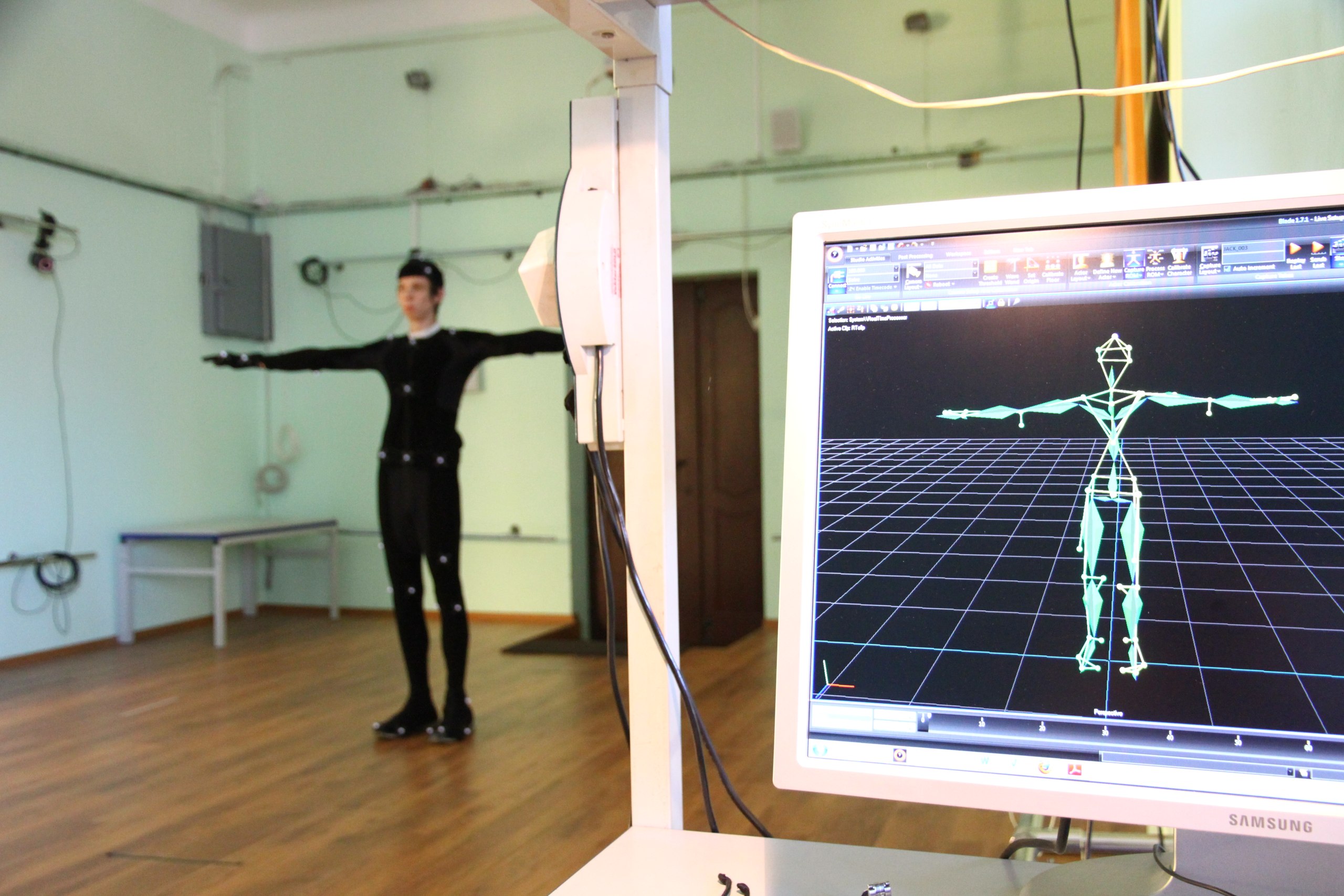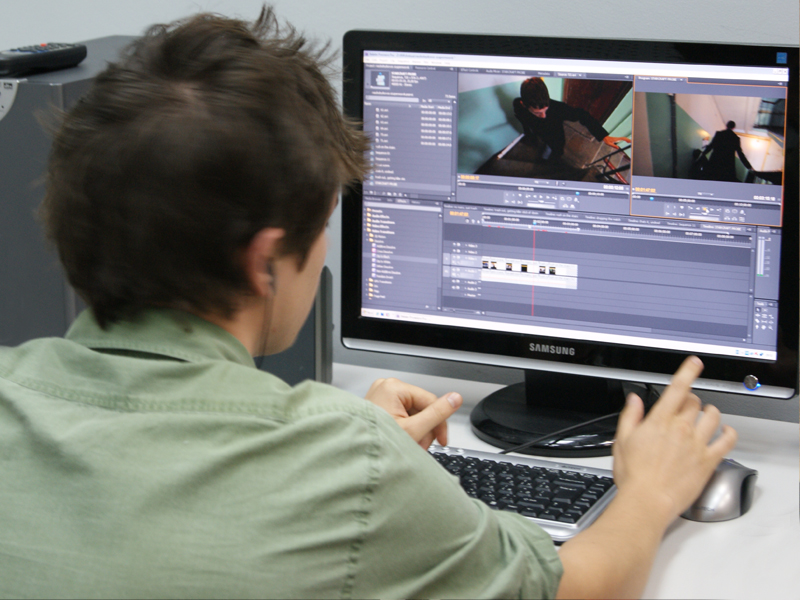
Film and TV Directing
55.05.01 Film and TV Directing
Specializations:
- Director of Fiction Film and TV Film
- Director of Non-Fiction Film and TV Film
- Director of Animation and Computer Graphics
- Director of Multimedia
- Director of Television Films, TV Programmes
Qualification: Director
Specialization "Director of Fiction Film and TV Film"
The most advanced technologies and visual innovations will not replace the main person on the stage - the director. Students acquire their professional skills to create their own films and videos based on original screenplays and other literary works. This training allows students to develop directing skills to guide actors, cameramen, art director, composer, sound engineer and other members of a creative crew.

During the training process, students create audio-visual works which become the basis for their professional growth. Best students’ works take part in variety of festivals and competitions.
Each year, students do internships at the Lenfilm studio and various TV channels and receive the necessary experience for their future work.
The majority of teachers of the Department are working cinematographers creating successfully films of various genres. At the Department, prominent cinematography personalities are involved in educational process. They are Konstantin Lopushansky, People’s Artist of Russia; Victor Buturlin and Sergey Ovcharov, Honoured Art Workers of Russia. Young directors are also actively involved in the film production process, among them Ilya Kazankov, Artyom Antonov and others.
Among recent graduates are Directors Andrei Kravchuk ("Admiral", "Italian", "Viking"), Anton Sivers ("Swings", "Butterfly Kiss", "Kamenskaya-5", "House on the side of the road", "Vasilisa"), etc.
Each year, the University shoots about a hundred short-length films, ranging from educational to professional ones.
Every year, the works of our students and graduates become laureates of more than fifty domestic and foreign festivals. For example, Georgy Porotov's film “Family Offline” (2016) became the film of the opening of the international festival in Cottbus (Germany), won the main prize of the festival in Kazakhstan and took part in the Beijing International Student Film Festival.

Curriculum Disciplines
Basic part: basic foreign language; professional foreign language; Russian language and speech standards; history; philosophy; economics; fundamentals of law and copyright in media industry; basics of state cultural policy in the Russian Federation; history of foreign literature; history of modern foreign literature; history of Russian literature; history of modern Russian literature; history of foreign cinematography; history of national cinematography; history of Russian and foreign fine art; basis of film dramaturgy; information systems and technologies; psychology; psychology of art; methods of teaching professional subjects; fiction film directing; work on a staging project; theory and practice of editing; director's work with actor and non-actor on the film stage; film sound solution; film artist art; costume in film production; film drama and screenwriting; modern editing programs; actor's art; scenic speech.
Variable part: TV film directing; non-fiction film directing; make-up and postiche in film production; basics of film production; film analysis; present-day video technology and digital technologies.
Electives: cinema special effects, basics of multimedia, festival distribution of audiovisual works, postproduction, producing in the media industry, foreign film business and foreign co-production, music in the cinema; history and theory of music.
Specialization "Director of Non-Fiction Film and TV Film"
Students of this specialization gain theoretical knowledge and practical skills in creating cinema and television films of non-fiction genres. These are popular science films, social pictures, films about animals and travel.
In the process of learning, students complete a full course of both special and general educational disciplines. They get skills for creating the literary basis of future films, put into practice the new knowledge when shooting, editing and sounding; they are studying the history and theory of non-fiction cinema. Each year of their studies, they shoot educational films of various genres, for example film-portrait, film-research, author's non-fiction film and others.
The curriculum includes such a subject as the work of a director with an actor, which is necessary for the creation of pseudo-documentary films. Particular attention is devoted to working with film and television archives, necessary when creating documentaries.
The heads of workshops are actively functioning directors, participants and winners of domestic and foreign festivals.
Graduates of this specialization are widely in demand, as the number of non-fiction films launched into production is growing. This factor is due both to the increasing number of non-fiction films launched annually in the production and to the ever-increasing content of non-fiction television films on Russian TV channels.
The works of our students participate in a wide range of festivals, both domestic and international. For example, Anastasia Novikova’s film "Talk" (2014) won the main prize of the Madrid International Festival.
Students often attend international events in search of material for their films. In 2014, many students went to Sochi to make films about the Olympic Games, communicate with the champions and show them not only from the professional but also from the human side. These films became winners and laureates of such festivals as "Student TEFI", "Window to Europe" and "Flahertiana".
Curriculum Disciplines
Basic part: basic professional foreign language; professional foreign language; Russian language and speech standards; history; philosophy; economics; science of law and copyright in media industry; basics of state cultural policy in the Russian Federation; history of foreign literature; history of modern foreign literature; history of Russian literature; history of modern Russian literature; history of foreign cinematography; history of national cinematography; history of fine art; basis of film dramaturgy; information systems and technologies; psychology; psychology of art; methods of teaching professional subjects; ethnogenesis and the biosphere of the earth; non-fiction film directing; work on staging project; theory and practice of editing; film sound solution; visual film solution; film artist art; cameraman art; costume in film production; film drama and screenwriting; modern montage programs; actor's art; scenic speech; work with movies and TV archives; theory of non-fiction film.
Variable part: basics of animation and computer graphics; journalism; TV art.
Electives: cinema special effects, basics of multimedia, festival distribution of audiovisual works, postproduction, producing in the media industry, foreign film business and foreign co-production, music in the cinema; history and theory of music.
Specialization "Director of Animation and Computer Graphics"
Students of this specialization obtain knowledge and skills to create animated films of their own design based on an original screenplay or literary works applying a wide range of computer and animated technologies.
In the process of creating an animated film, the directors of animation and computer graphics unite and direct the creative work of the art director, cinematographer, animators, computer graphic artists, composer, sound producer and other members of the creative team.
Students have the opportunity to develop their own style during their studies. They will work with classic animation, 3D animation, stop-motion technique and experiment with motion capture technologies.
The heads of creative workshops are experienced directors, masters in the field of computer graphics. Our masters have realized such projects as "Smeshariki", "Luntik", "Barboskiny" and many others. Graduates work at animation studios, documentary film studios, participate in Russian and international creative projects and create special effects for film and television.
Animated films of students and graduates of our university annually participate in a variety of domestic and foreign festivals. Each year, our students participate in the largest animation festival in Russia - the Open Russian Animation Festival - held in Suzdal, where they have the opportunity to receive feedback from such famous animation masters as Yuri Norstein, Mikhail Aldashin, Mikhail Tumelya, etc.

Curriculum Disciplines
Basic part: basic professional foreign language; foreign language in the professional field; Russian language and culture of speech; history; philosophy; economy; fundamentals of jurisprudence and copyright in the media industry; basics of the state cultural policy of the Russian Federation; history of foreign literature; the history of modern foreign literature; history of Russian literature; the history of modern domestic literature; history and theory of cinema; art history; basics of scripting; information systems and technologies; psychology; psychology of creativity; methods of teaching professional subjects; the direction of the animated film; work on a staging project; theory and practice of editing; animation (multi-motion); sound film solution; visual solution of an animated film; operator skills; theory and practice of computer graphics.
Variable part: dramaturgy of animated film; 3D animation.
Electives: artistic motion, actor's mastery; producing in the media industry, foreign film business and foreign co-production; music in the cinema, history and theory of music.
Specialization "Director of Multimedia"
Our University trains unique multimedia directing specialists. This specialization is for those who want to link their professional activities with the creation of a variety of multimedia works, such as history based computer games, an interactive, documentary or animated film published on the Internet, or a story told through virtual or augmented reality. It is no exaggeration to say that it is the new generation of directors, who understand the specifics of the digital environment, who are familiar with the methods of creating an interactive audio-visual products and who are able to apply the latest technologies in their work, ensure the success of the rapidly developing digital media industry today.

The faculty is equipped with modern facilities for creating digital media, 2D and 3D animation, creating visual effects. Students are taught by experienced teachers and specialists in the field of multimedia and audiovisual arts.
In future professional activity, graduates in this specialization will be dealing with computer and video games, web projects, interactive game and documentary films, interactive animation, multimedia advertising, visual effects for cinema, television and computer games.
The main focus of this educational program is to develop artistic thinking and creative skills of future creators of interactive works. At the same time, modern equipment and technologies are considered as important components of audio-visual creativity, serving the most complete implementation of the author's concept.
Along with the training course in film and television directing, an essential condition for students of this specialization is mastering the expressive possibilities of modern computer art and developing software skills. Much attention is paid to training in the field of computer graphics and visual effects in movies, television films, as well as in computer games using the latest technologies.
Graduates acquire the skills of mastering the specifics of creating interactive multimedia works and computer games, participate in current projects of film, television, multimedia studios in St. Petersburg (Creat Studio Inc., Lesta, Nival Network, Phantomery, etc.).
Students participate in various international conferences, festivals and workshops. Cooperation is organized with leading educational and research centres - CNAM-ENJMIN (France), Media Lab (Finland), Estergazy Karoli College (Hungary). Student exchange takes place in the framework of the "Digital Media International Student Exchange Program".
Graduates worthily represent the faculty with achievements in professional activity. Among the graduates are the head of IWAIT4 computer games studio, leading game designers of "IndeePop Games" and "TallMouse Games" studios, a leading computer graphics and digital technology expert of RWS and a creative director of "i-Free".
Curriculum Disciplines
Basic part: basic professional foreign language; foreign language in the professional field; Russian language and culture of speech; history; philosophy; economy; fundamentals of jurisprudence and copyright in the media industry; basics of the state cultural policy of the Russian Federation; history of foreign literature; history of Russian literature; history of foreign cinema; history of domestic cinema; history of art; basics of screenwriting; information systems and technologies; psychology; psychology of creativity; methods of teaching professional subjects; directing multimedia; work on a staging project; theory and practice of editing; directing interactive media and advertising; sound solution of television films and programmes; artistic solution of television films and multimedia project; basics of painting and drawing; basics of drama and interactive media; camera art; theory and history of digital media; technique and technology of media production; computer graphics and animation; actor's art.
Variable part: computer and music technology; digital postproduction images; basics of programming.
Electives: producing in the media industry, foreign film business and foreign co-production; theory and game design practice, creating an interactive project.
Specialization "Director of TV Films and TV Programmes"
The specialization "Director of TV Films, TV Programmes, Educator" is fascinating, interesting and in demand in the modern labour market. Having received a diploma in this specialization, graduates of the Television Department successfully work on leading television channels in Moscow, St. Petersburg and other Russian regions, in film and video studios, production centres, companies engaged in advertising production, public relations (PR) and teach at various educational institutions.
Studying a wide range of professional and general education disciplines, making educational television programmes and films in an educational television and video studio, internships and practical trainings in professional film, television and video studios allow successful students to acquire valuable knowledge and creative experience. The students work in the following positions: film director, television director, Internet director, editing director, advertising media director, television reporter, on-air host, screenwriter for cinema and TV, TV journalist, editor, creative producer.
Students and graduates of the Television Department are laureates and winners of such successful film and TV awards as the "Student Taffy", the Russian festival of student and debut films "Saint Anna", St. Petersburg State University of Film and Television's International Festival "PiterKiT", professional Russian and international film and television festivals.
The Television Department is one of the oldest creative departments of the university. It employs prominent film and television figures who have made a significant contribution to the development of screen arts. These are laureates of the State Prize of the Russian Federation, Professors E.G. Plugatyreva, A.P. Krivonos, Doctor of Art History, Professor V. F. Poznin, laureates of international and Russian cinema and television awards, associate Professors G. M. Nechaeva, V. G. Nechaev , P. Ya. Soldatenkov, V. Yu. Obogrelov, A. V. Dranitsina, winner of international and Russian film awards, Candidate of Art Criticism, director of artistic and documentary films S. V. Potemkin.
The head of the department is Andrei Radin, who is the winner of the GRAND-PRI "The Best Journalist of St. Petersburg 2002", five-time winner of the "Golden Pen", well-known television journalist who has created the local NTV broadcasting in St. Petersburg, headed the TV channels "100TV" and "78", the Internet channel "Piter.TV", and the CEO of the "47 channel" ("Leningrad regional television") at the present time. Students of the department have the opportunity to attend master classes of eminent and renowned masters of screen arts, such as directors Krzysztof Zanussi, Nikita Mikhalkov, Alexander Sokurov, Vladimir Khotinenko, Viktor Merezhko, actors Sergey Bezrukov, Leonid Mozgovoy, Svetlana Kryuchkova, television stars Leonid Parfenov, Kirill Nabutov, Catherine Dodzina and others. The best students are sent to internship in leading Russian and foreign film and television studios and creative universities.
Curriculum Disciplines
Basic part: basic professional foreign language; foreign language in the professional field; Russian language and culture of speech; history; philosophy; economy; fundamentals of jurisprudence and copyright in the media industry; basics of the state cultural policy of the Russian Federation; history of foreign literature; the history of modern foreign literature; history of Russian literature; the history of modern domestic literature; the history of foreign cinema; the history of domestic cinema; the history of art; basics of screenwriting; information systems and technologies; psychology; psychology of creativity; methods of teaching professional subjects; mastery television director; work on a staging project; theory and practice of editing; directing a television film; creation of works of various nature; the work of the director with an actor and not an actor; the sound solution of television films and programmes; the artistic decision of television films and programmes; film drama and screenwriting on television; cameraman's skill; technique and technology of television production; actor's art.
Variable part: directing of a multi-camera shooting; basics of television journalism; history of television.
Electives: directing of a clip and advertising; directing of advertising; Internet technologies in the activities of the director, basics of multimedia; producing in the media industry, foreign film business and foreign co-production; music in the cinema, history and theory of music.


 Search
Search